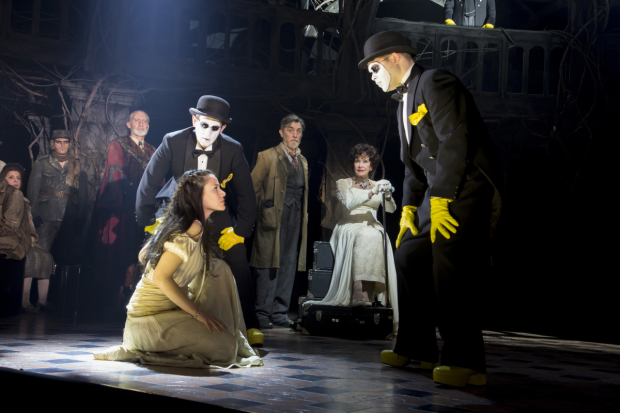
(© Thom Kaine)
Audiences at The Visit erupt as Chita Rivera glides across the stage of the Lyceum Theatre for her grand entrance as the widowed billionaire Claire Zachanassian. It's a role the legendary stage actress has been incubating since 2001 — back when she was first performed the character adapted from Friedrich Dürrenmatt's 1956 play. Fortunately, 14 years makes little difference to the ageless Rivera, who soaks in the ethereal spotlight with unwavering power and elegance.
Because of its long gestation period, the musical has become its own time capsule, offering Broadway audiences a "brand new" score by composer John Kander and lyricist Fred Ebb — one of their final collaborations before Ebb's passing in 2004. Though one of the most original scores to come to Broadway this season, The Visit is not destined to join the ranks of Chicago or Cabaret as one of the pair's immortal masterpieces. Even so, the sense of living history on the Lyceum stage is reason enough to greet the musical's groundbreaking group of artists with all the pomp and circumstance Broadway has to offer. Book writer Terrence McNally completes the team of creators with fitting symmetry (and possible foreshadowing), as Rivera earned both of her Tony Awards off of characters penned by this trio of collaborators in The Rink and Kiss of the Spider Woman.
Dürrenmatt's eerie parable of betrayal and the price of justice suits Kander and Ebb's darkly comic body of work, with Tony winner John Doyle as a perfectly sinister visual interpreter. The set is an abandoned train station — an imposing abyss covered in vines and roots, designed with menacing grandeur by Scott Pask. Here we find the Swiss town of Brachen, a community that fell to ruin after Claire Zachanassian (at the time, Clara Wascher) left it behind years ago. Several husbands later (a timeline of marriages Rivera tells through the irreverent tune "I Walk Away"), she returns to her hometown with more than enough wealth to save it and is greeted by a hoard of downtrodden residents who hope she will find it in her heart to do just that.
However, it seems to have slipped everyone's mind that Brachen was less than welcoming to the poor half-Gypsy-half-Jewish Clara Wascher as a young girl. She suffered horrific injustices, particularly at the hands of her old flame Anton Schell (Roger Rees), who left her under egregious circumstances to marry Matilde Schell (an underutilized Mary Beth Peil). Now the tables have turned as she basks in the glow of wealth with her glimmering white gown, fine jewels, and an overhead follow spot that shines down like a personal ray of sunlight (a striking design by Japhy Weideman), while the rest of the town marches around in dirty old rags (designed with juxtaposing grit by Ann Hould-Ward).
With the future of Brachen in her scorned hands, she proposes a deal that leverages the town's natural greed to place Anton's head on the chopping block. The terms are money for an execution — a justice she could never afford when she was Clara Wascher. The town initially refuses the deal in moral protest, most adamantly expressed by the proudly ethical schoolteacher Frederich Kuhn (the wonderfully tenor-voiced Jason Danieley), but there is never much question whether baser human instincts will win out. Purchases on credit promptly fill the town with bright yellow trinkets — the color of affluence on parade in the number "Yellow Shoes," featuring Kander and Ebb's talents for the grotesquely peppy.
This snapshot of human nature is sufficiently gruesome, but does not offer the tension we need to pull us through the story. Doyle builds a stunning visual shell for this emotionally and intellectually compelling fable, but characters betray the potential that this skeleton promises to deliver. Anton is all too agreeable to his fate while Claire's unwavering determination makes her journey feel arc-less, even as the pair's love story bubbles to the surface. Neither McNally's book nor Rees and Rivera's tepid chemistry adds the friction we crave from Anton and Claire's persisting passion for each other, though John Riddle and Michelle Veintimilla insert some much needed heat into their relationship as apparitions of their young passionate selves, sensually performing Graciela Daniele's fiery choreography (Daniele also choreographs a tender moment for Rivera and Veintimilla). The young lovers also assist their older counterparts in the show's love ballad "You, You, You," one of Kander's more memorable melodies. Rees struggles through his sung moments but Rivera's wobbly voice continues to reverberate with her signature alto timber as she holds her cane like a scepter, commanding the stage like its royal monarch.
None of the tunes are destined to be classics, but they do a fine job capturing Dürrenmatt's tone of shadowy surrealism — a genre not often tapped for musical theater and rarely seen on today's commercial Broadway roster. The Visit, sadly, is part of an endangered theatrical species, and while a similar specimen may not appear on Broadway for some time, it's heartening to know our founding fathers have a permanently reserved seat at the table.









